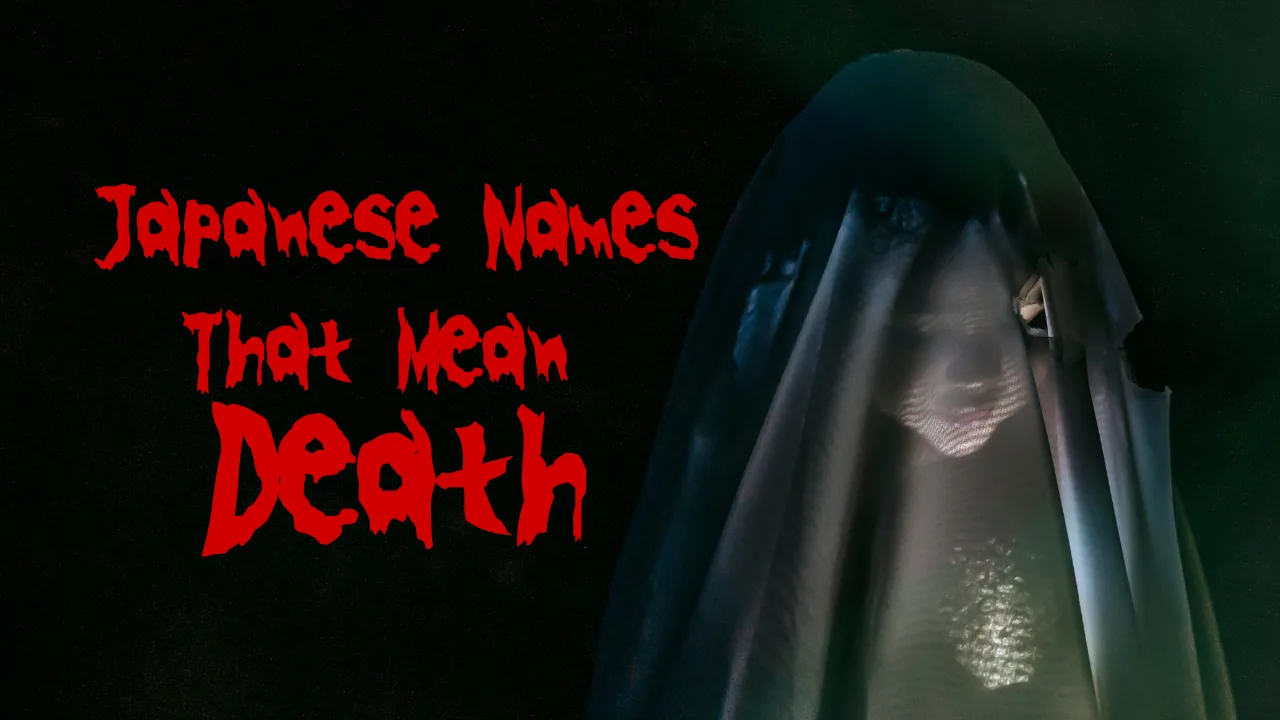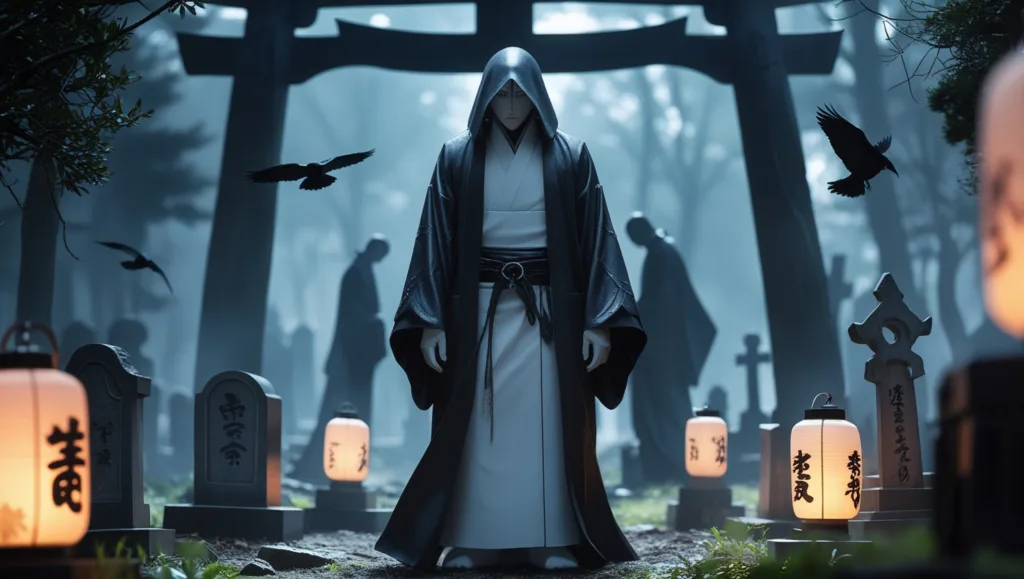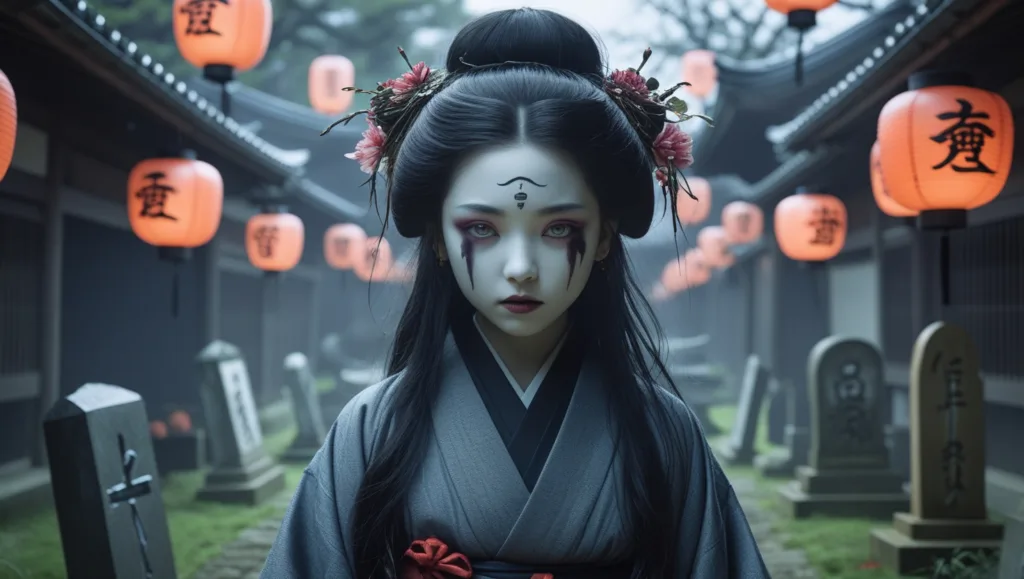200+ Unique Japanese Names That Mean Death Or Darkness With Meanings

I was utterly fascinated when I first came across the idea of names that hold deep and often dark meanings. Language and culture intertwine in beautiful and mysterious ways, and nowhere is this more apparent than in Japanese names. Among these, names that mean “death” stand out for their unique allure, evoking curiosity and respect for the symbolism they carry.
In Japanese culture, names are more than identifiers; they often carry meanings tied to nature, history, and philosophy. Sometimes, names linked to concepts like death are chosen not for their morbidity but for their poetic and philosophical undertones. Today, I want to delve into this niche but captivating subject: Japanese names that mean death, exploring their origins, interpretations, and cultural significance.
Examples of Japanese Names That Mean Death
- Shinigami (死神) – The Death God
Let’s start with one of the most iconic terms in Japanese culture: Shinigami, meaning “death god” or “grim reaper.” While not a personal name in the traditional sense, Shinigami has become recognizable thanks to Japanese folklore and modern media like anime and manga. If used as a name, it carries an air of mysticism and reverence for life’s end. - Shiho (死帆) – Death Sail
The name Shiho is a poetic expression, combining “shi” (death) with “ho” (sail). It conjures images of a lone sailboat drifting into the horizon—a metaphor for the journey after life. While rare and unconventional, this name can symbolize a peaceful acceptance of mortality. - Shiori (死織) – Woven Death
The name Shiori can be written with characters that mean “death” and “weaving” or “guidance.” This duality gives the name a layered meaning, suggesting someone who navigates or weaves through life’s inevitable cycles, including death. - Kuroshi (黒死) – Black Death
Derived from “kuro” (black) and “shi” (death), Kuroshi is stark and striking. While it might sound ominous, it can symbolize the profound mystery of the unknown, often associated with death in Japanese philosophy. - Naomi (尚死) – Respect for Death
Though commonly associated with Western names, Naomi can also be written in kanji, translating to “respect” and “death.” It represents a dignified approach to mortality, reflecting a person who values the inevitability of life’s end.
Japanese Names That Mean Death
Choosing a Japanese name meaning death can be a huge and impactful decision. You should consider names that reflect cultural reverence, acceptability, and modernity.
Let’s explore some Japanese names that mean death.
- Shin (死新) – Death and newness, symbolizing transformation.
- Ren (蓮死) – Lotus of death.
- Nao (直死) – Honest death, suitable for all genders.
- Akira (晶死) – Bright, apparent death.
- Kaze (風死) – Wind of death.
- Sora (空死) – Sky of death.
- Hikari (光死) – Light of death.
- Aoi (青死) – Blue death, evoking mystery and calm.
- Kai (海死) – Ocean of death, reflective of vastness.
- Itsuki (樹死) – Tree of death, symbolizing endurance.
- Mizu (水死) – Water of death.
- Haru (春死) – Spring death, evoking cycles of life.
- Riku (陸死) – Land of death, grounding and enduring.
- Tsubasa (翼死) – Wings of death, symbolizing freedom.
- Kuro (黒死) – Black Death, mysterious and profound.
- Kiri (霧死) – Fog of death, symbolizing ambiguity.
- Natsu (夏死) – Summer death, symbolizing warmth and change.
- Shion (紫苑死) – Aster of death, often linked to remembrance.
- Hoshi (星死) – Star of death, reflective of eternity.
- Ame (雨死) – Rain of death, symbolizing cleansing and renewal.
- Yuki (雪死) – Snow of death, pure and serene.
- Tomo (友死) – Friend of death, indicating companionship in endings.
- Midori (緑死) – Green death, tied to nature’s cycles.
- Fuji (藤死) – Wisteria of death, often poetic in meaning.
- Asa (朝死) – Morning death, symbolizing a new beginning.
Japanese Names That Mean Death for Males
When it comes to male names associated with death, they often embody strength, mystery, and a connection to the supernatural. Here are 25 examples with their meanings:

- Shigeru (死輝) – Death and brilliance.
- Takeshi (武死) – Warrior of death.
- Kuroshi (黒死) – Black death, a symbolic name of mystery.
- Shirou (死郎) – Son of death.
- Masashi (雅死) – Elegant death, a poetic interpretation.
- Haruto (陽死) – Death of the sun.
- Reiji (霊死) – Spirit and death.
- Yamato (大和死) – Death of great harmony.
- Daisuke (大死輔) – Great helper in death.
- Shinta (真死) – True death.
- Seiji (清死) – Pure death.
- Kenshiro (剣死郎) – Sword of death.
- Arata (新死) – New death, indicating a cycle or rebirth.
- Hikaru (光死) – Light and death.
- Toru (通死) – Death through passage or transition.
- Kaoru (薫死) – Fragrance of death.
- Renji (蓮死) – Death and the lotus flower.
- Kaito (海死) – Ocean of death.
- Hideo (英雄死) – Heroic death.
- Junpei (純死平) – Pure and peaceful death.
- Riku (陸死) – Land of death.
- Takashi (高死) – Elevated death.
- Souta (蒼死多) – Many blue deaths.
- Tatsuya (竜死也) – Dragon’s death.
- Ryosuke (涼死輔) – Cool and assisting death.
Related: Funny, Cool Gang Names for Boys & Girls
Japanese Names That Mean Death for Females
Female names with meanings tied to death often reflect elegance, resilience, and a deep philosophical perspective. Here are 25 such names:

- Shiho (死帆) – Death sail, symbolizing a peaceful journey.
- Shiori (死織) – Woven death, suggesting complexity and grace.
- Yuriko (百合死子) – Lily of death.
- Akemi (明死美) – Beautiful dawn of death.
- Aiko (愛死子) – Child of death and love.
- Chiyo (千代死) – Thousand generations of death.
- Haruka (遥死) – Distant death.
- Kaede (楓死) – Maple of death, evoking autumnal imagery.
- Hana (花死) – Flower of death.
- Misaki (美咲死) – Beautiful bloom of death.
- Reina (麗死名) – Elegant name of death.
- Natsumi (夏美死) – Beautiful summer death.
- Kohana (小花死) – Little flower of death.
- Eiko (栄死子) – Glorious death.
- Sakura (桜死) – Cherry blossom of death, symbolizing impermanence.
- Ayumi (歩美死) – Walking beauty of death.
- Akira (晶死) – Bright and crystalline death.
- Hinata (日向死) – Death in the sun’s direction.
- Miyuki (美雪死) – Beautiful snow of death.
- Nao (直死) – Honest death.
- Yume (夢死) – Dream of death.
- Rika (梨花死) – Pear blossom of death.
- Nanami (七海死) – Seven seas of death.
- Setsuna (刹那死) – Momentary death.
- Mei (明死) – Bright death, often seen as hopeful.
Related: Cool Gamer Names for Girls: Unique & Badass Tags
The Cultural Symbolism of Death in Japanese Names
Japanese names associated with death often carry profound philosophical undertones. They remind us that death isn’t something to fear but a part of life’s natural rhythm. Here are some cultural themes tied to these names:
- Impermanence (無常, Mujō):
In Buddhism, the concept of impermanence is central. Names like Shiho or Shiori reflect the transient nature of life, urging us to cherish the present moment. - Transformation:
Death in Japanese culture is often seen as a transition rather than an end. Names like Kuroshi may symbolize a journey into the unknown, emphasizing rebirth or spiritual awakening. - Respect and Reverence:
Names such as Naomi convey respect for the natural order. In Japanese society, acknowledging death with reverence aligns with broader values of harmony and balance.
Understanding the Context of Names Linked to Death
In many cultures, death is a taboo topic, often avoided in daily conversation. However, in Japan, death isn’t always viewed as something negative. Instead, it is frequently seen as a part of the natural cycle of life. This perspective is deeply rooted in Buddhist beliefs and Shinto traditions, emphasizing life’s impermanence and the beauty of fleeting moments.
Names associated with death may be chosen for various reasons. Sometimes, they symbolize resilience, transformation, or the ability to overcome tragedy. In other cases, they are linked to stories of gods, spirits, or historical events. It’s essential to approach these names with sensitivity and an appreciation of their layered meanings.
Are These Names Used in Modern Japan?
While names explicitly associated with death are rare in modern Japan, they may appear in literary works, historical references, or artistic expressions. Parents tend to choose names with positive and auspicious meanings for their children, as names are believed to influence one’s destiny. However, death-related names often hold a dramatic, poetic appeal in fictional narratives or as pen names.
Popular Media and the Fascination with Death Names
If you’re an anime fan like me, you’ve probably noticed how often Japanese media explores themes of death and the supernatural. Characters with names like Shinigami or related terms usually play significant roles in these stories. For instance:
- Death Note: Ryuk is associated with Shinigami, embodying death’s mischievous yet inevitable nature.
- Bleach: In this series, Shinigami are portrayed as protectors of souls, blending traditional folklore with modern storytelling.
The recurring use of such names in media reflects a cultural fascination with death as a concept to be understood rather than feared.
Choosing a Name with Depth
If you’re drawn to names that mean death, it’s essential to consider their context and cultural significance. Whether you’re naming a character, exploring your ancestry, or simply curious, here are a few tips:
- Understand the Kanji:
Japanese names can have multiple meanings depending on the characters (kanji) used. For example, “Shi” can mean death, poem, or branch, depending on the context. - Appreciate the Philosophy:
Names associated with death often carry deeper meanings about life, impermanence, and transformation. Embrace the full spectrum of their symbolism. - Respect Cultural Sensitivities:
While exploring death-related names, it’s crucial to approach the subject with respect, especially if you’re outside the Japanese culture.
Why Death-Related Names Resonate with Me
I’ve always found a strange beauty in the concept of impermanence. The fleeting nature of life reminds us to value our time and cherish the people around us. Exploring Japanese names that mean death has deepened my appreciation for how language and culture intertwine, offering unique perspectives on universal truths.
These names aren’t just about death—they’re about resilience, growth, and the mysteries of existence. They invite us to think deeply, not just about endings but also beginnings. For me, that’s what makes them so captivating.
Conclusion: Finding Meaning in Mortality
Names that mean death might sound morbid initially, but they hold profound lessons about life and its fleeting beauty. In Japanese culture, these names are deeply symbolic, reminding us of the cyclical nature of existence and the importance of embracing all aspects of life—even its end.
Whether you’re fascinated by the philosophy behind these names, looking for inspiration for a story, or simply curious, I hope this exploration of Japanese names that mean death has offered a fresh perspective. After all, names are more than words—they’re vessels of meaning, culture, and humanity.
FAQs
What is a dark Japanese name?
"Yami" (闇) means "darkness" and "Kuro" (黒) means "black." Both evoke a sense of mystery and the unknown.
What Japanese name means lost child?
The Japanese name "Maigo" (迷子) means "lost child."
What Japanese name means silent?
The Japanese name "Shizuka" (静か) means "silent" or "quiet."






